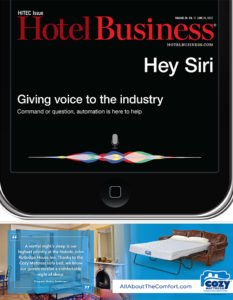NEW YORK—Just a day after the NYU International Hospitality Industry Investment Conference, the Boutique & Lifestyle Lodging Association (BLLA) hosted its annual Boutique Hotel Investment Conference a few blocks away at The Times Center, to shake up the world of boutique hotels.
“The world of hospitality has changed a great deal since our first Boutique Hotel Investment Conference five years ago, and this is due in no small part to the efforts of the rebels, non-conformists, influencers, inventors and thinkers who make up our global boutique and lifestyle tribe,” said Frances Kiradjian, founder and chair at BLLA—an organization dedicated to the luxury independent boutique lodging and lifestyle industries. “The sector has grown beyond our wildest dreams—and with this success has come imitation from our largest competitors, who have taken note and want a piece of the action. But we’re not the types to rest on our laurels, and repetition and complacency are not in our playbook. We’re staying ahead of the game, taking risks and testing new ideas. Our presentation line-up this year is a testament to this: a roll-call of rebels, pioneers and vanguard thinkers.”
Held earlier this month, the Boutique Hotel Investment Conference pulled in investment firms, design firms, brand executives and other hospitality leaders to converse on a variety of topics pertaining to the space—including companies from other industries getting into the boutique hotel business; boutique hotel development; equity; and branded hotels transitioning to boutique hotels.

TOP TO BOTTOM: CNN’s Vanessa Yurkevich interviews Arianna Huffington.
Moderated by Lana Trevisan, Two Roads Hospitality (far left), a panel discusses how F&B is important to guests.
Photos: BLLA
BLLA also took some time out of its packed agenda to promote a couple of its latest initiatives to its membership. “BLLA is always working on initiatives that are driven by conversations with all of you, our membership, our board of advisors and by our customers,” she said.
Announced in October 2016, BLLA Grand Bazaar will be soft launching this summer. The new digital platform for hotels is “the shopping network for the boutique community,” she said. The website is designed as a place for hotels to source, compare and shop for manufacturers, products and service providers. “All companies will be vetted for quality, reliability and product or service effectiveness,” she added. Only BLLA members are able to leverage the network. The association doesn’t take a commission or a percentage from any transaction.
Unveiled by Ariela Kiradjian, VP at BLLA, Stay Boutique, a new platform designed with the boutique hotel industry in mind, will launch in Q3 2017. Defined as a “hub for innovators, leaders and those who believe in the power of boutique,” the new platform attempts to define what a boutique hotel is by creating a global list of boutique hotels. In addition to more benefits, BLLA members on the list will be provided with a direct booking platform. The platform will also provide media content, videos, invite-only events and resources to help grow the boutique entity.
As the event’s keynote speaker, Ted Teng, president and CEO of Leading Hotels of the World, conceptualized the overall theme for the rest of the conference by focusing the entirety of his address on two main points: the creativity of the boutique hotelier and customer centricity. “We are the masters, creators of the hotel product,” he said. “Boutique hotels are often the most creative hotels.”
The biggest takeaway: product alone isn’t enough. He considers companies like Apple and Walmart to be product-centric companies. The boutique hotel industry, on the other hand, has to be more than that. “In the world of customer centricity, the customer actually doesn’t exist,” he said. “Only individual customers do.”
Narrowing the customer segment down and gaining insight from individual customers “is very, very doable” with technology, Teng said. Creating a technology-enabled ecosystem to capture long-term loyalty is possible. Obtain the information collectively, and then use the results to serve customers individually.
He concluded his address with a simple message to the audience: “May you lead with great products and live long and prosper with customer centricity.”
Moderated by Andrew Fay, The Gettys Group’s president, a panel consisting of Tony Kurz, CEO of BrandMark Collective; David Bowd, Experience West Elm Hotels’ principal; and Christopher Norton, CEO at Equinox Hotels continued to move Teng’s thoughts forward, centering the conversation around how and why other industries have been jumping into the boutique hotel game in recent days.
Each of the speakers on stage reiterated the significance of providing guests with experiences through their own respective brands, emphasizing the focus on the brand—not the product. For example, West Elm Hotels aren’t being designed to be showrooms for West Elm items, Bowd noted, jokingly adding that there won’t be any price tags on items in the room.
There’s an advantage to being an outsider: A brand already has a customer base; loyalty has already been established, Kurz noted. Geared toward consumers, these retail and lifestyle brands can also benefit from consumer publications (e.g., Vanity Fair) and other consumer-centric outlets covering their native industry.
A group participating in a session discussing hotel development coined a new grouping for gateway markets like New York, Los Angeles and Miami that tend to be a symbol of status—the Lifestyle 1.0 playbook. While some panelists agreed it’s essential to pay attention to these markets, especially from a branding perspective, they also recognized the opportunity with moving into a new area and owning it by creating a buzz and becoming part of the community. Again, a common point during the panel was that memorable experiences are vital.
Arianna Huffington also made an appearance at the conference to reiterate the importance for companies to put employees first.
Throughout the course of the event, panels also discussed the importance of securing funding, international and luxury hotel development, and transitioning to boutique hotels.
Lana Trevisan, VP of restaurants, bars and nightlife at Two Roads Hospitality, moderated another panel, which discussed the result of guests experiencing unforgettable moments—exposure on social media. “Social media today is probably one of the best tools to promote whatever we’re selling,” said Mark Birnbaum, co-founder of EMM Group. This is especially true when guests are the ones promoting experiences. Hotels should take advantage of this opportunity by providing guests with something to post on Instagram. “All of these things can really catapult you if you have a high volume of people doing it,” Birnbaum said. The panel also agreed on the effectiveness of promoters, since smaller groups acting as brand advocates can sometimes increase visibility more than larger names.
A discussion with Eric Danziger, CEO at Trump Hotels, concluded the evening, just before cocktail hour. In addition to promoting his hospitality group’s new brand, American Idea Hotels, Danziger more times than once pointed out the fact that he dislikes politics and is all about being a hotel guy, but—in keeping with the discussion regarding social media—he did joke about how Trump Hotels is “pretty popular on Twitter.” HB

